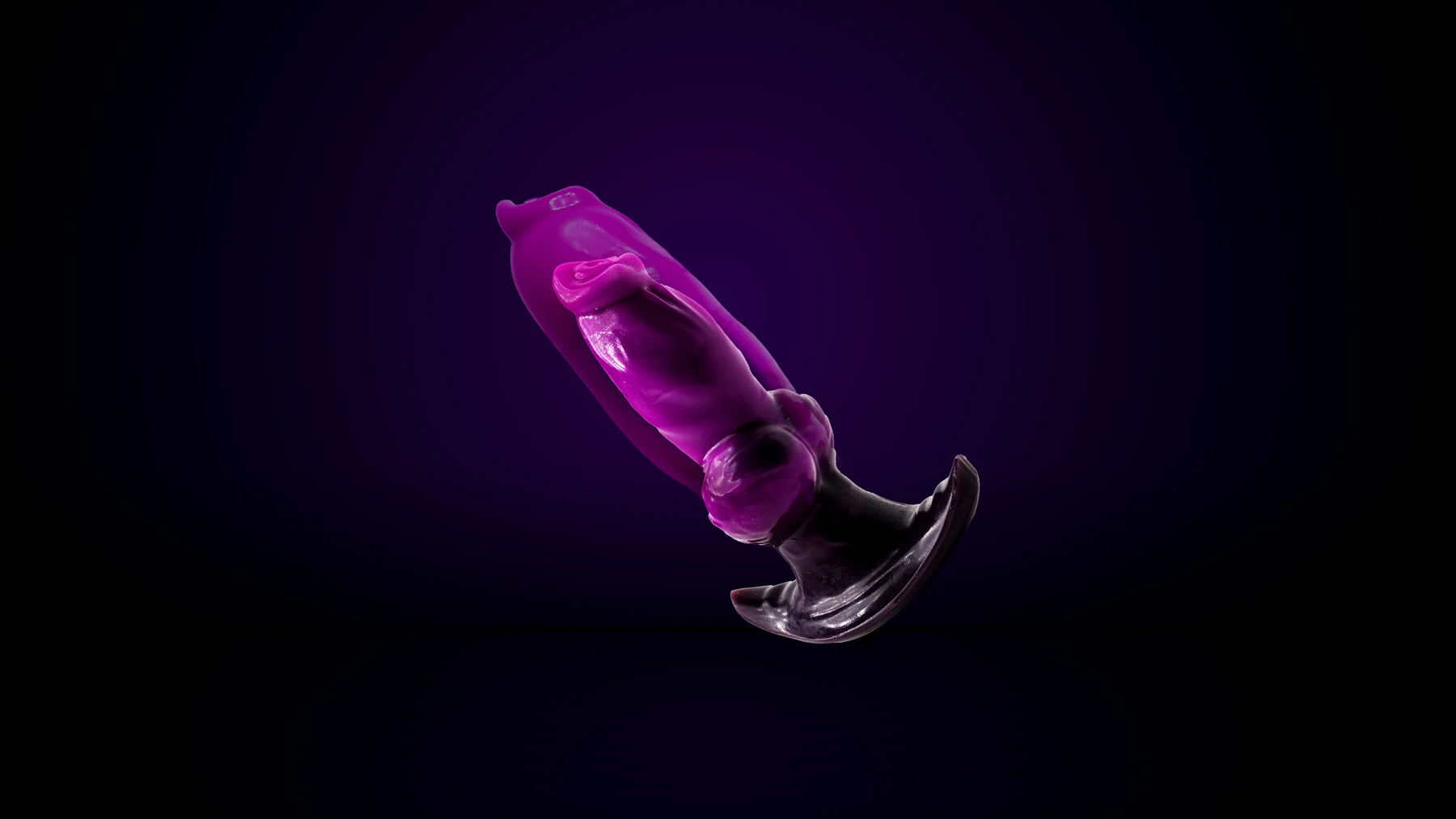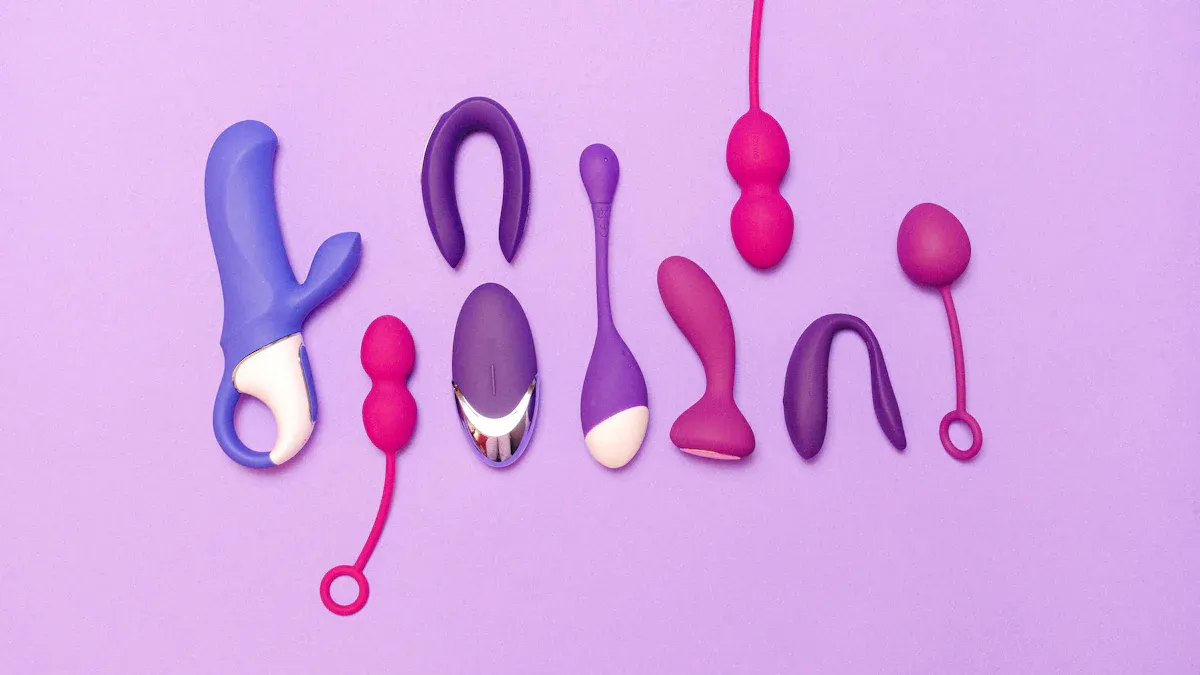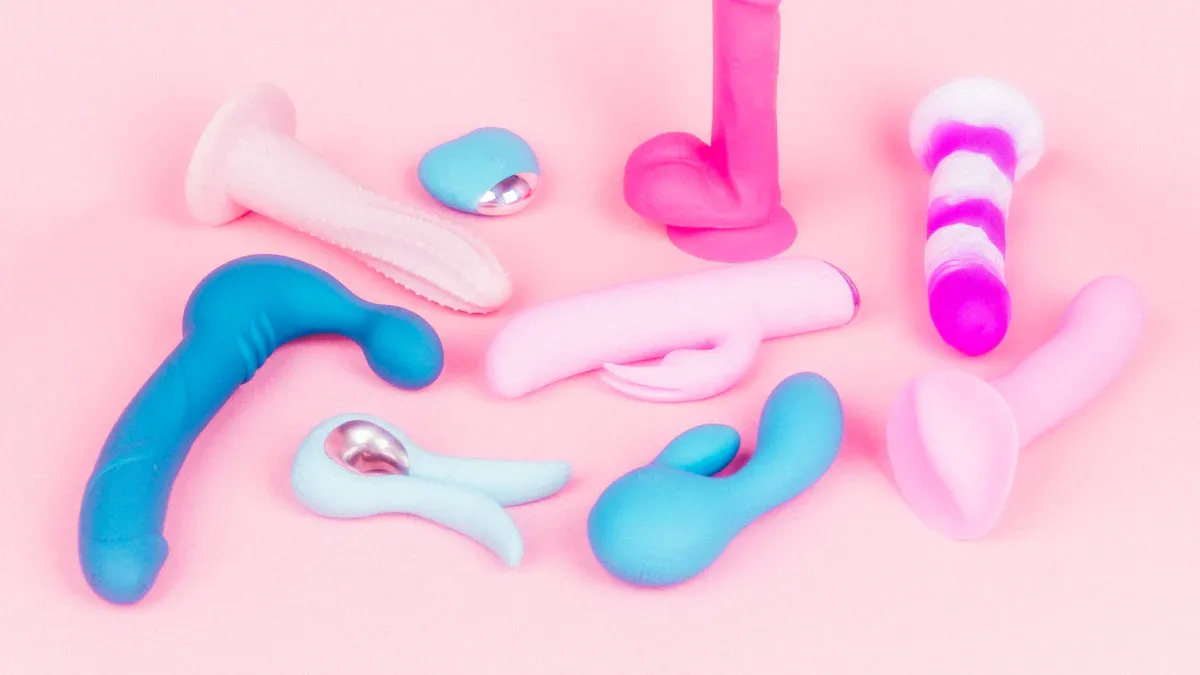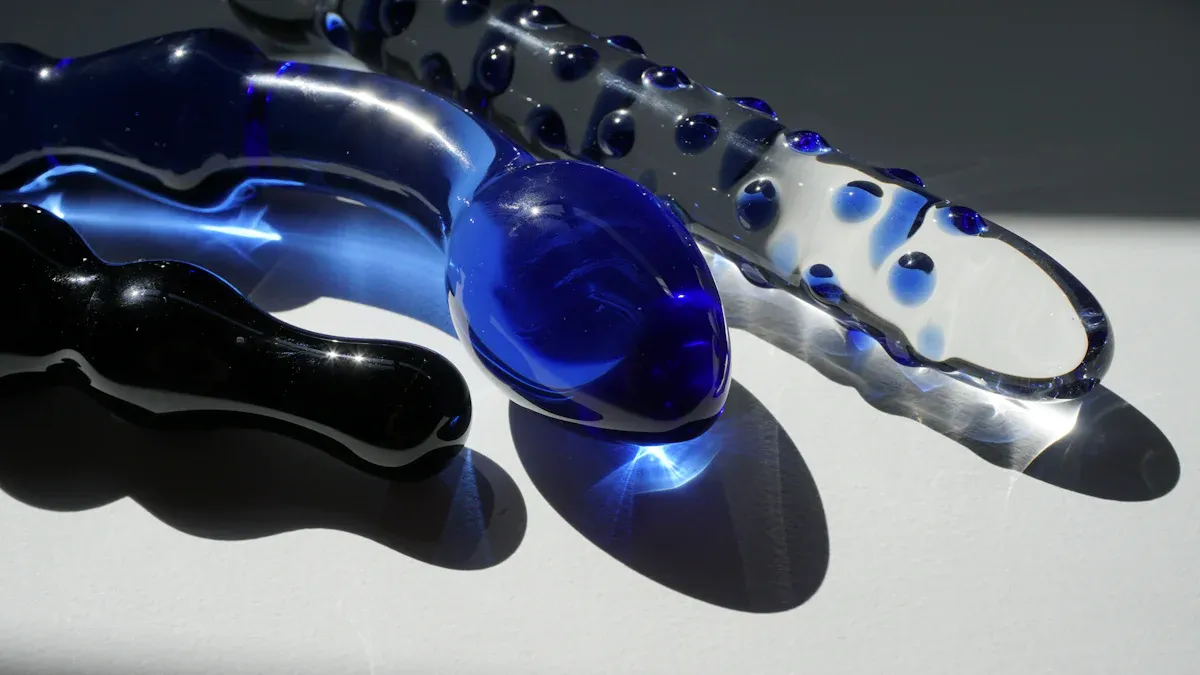How Safe Are PVC Dildos for Internal Use

You might ask if PVC dildos are safe to use inside your body. Many people pick PVC sex toys because they are cheap and bend easily. But there are some safety worries. Medical studies say using a pvc dildo can let chemicals like phthalates get into your body. These chemicals can be bad for your health. PVC sex toys can also keep bacteria and viruses on them. This is more likely if you share a dildo or do not clean it well.
Common health risks of using pvc dildos include:
Chemical exposure from phthalates
Higher risk of infections like HPV, HSV, chlamydia, and HIV
Picking body safe sex toys, like platinum silicone, helps you stay safe. Platinum silicone does not let germs in, is simple to clean, and is much safer for you. If you want a G Spot Dildos, Squirting Strap on Dildos, or a suction cup dildo, always check if it is platinum silicone for better safety.
What Is PVC

PVC means polyvinyl chloride. You can find this plastic in many things, like pipes and raincoats. Many sex toys use PVC because it is cheap and easy to shape. To make PVC soft, companies add chemicals called plasticizers. The most common plasticizers are phthalates. Phthalates help make the toy bendy and clear. Some brands say their toys are “phthalate-free.” But they do not always say what other chemicals they use. PVC always has chlorine in it. Chlorine can make harmful byproducts during the toy’s life.
Why PVC Is Used
Manufacturers pick PVC for a few reasons:
PVC costs less than most other materials.
It is easy to shape into many forms.
Factories can make lots of toys fast and keep them the same.
PVC toys can feel soft or hard.
Note: PVC is cheap and flexible. But it can be hard to clean. It may have chemicals that can cause irritation or health problems.
Common Features
PVC dildos come in many colors, shapes, and sizes. They can feel soft or hard, depending on how much plasticizer is used. PVC is not as bendy as TPE or silicone. But it is softer than hard plastics like ABS. PVC toys are usually not fully nonporous. This means they can trap bacteria in tiny holes.
Here is a table that compares PVC with other sex toy materials:
Material | Flexibility/Firmness | Safety/Porosity | Cost | Notes |
|---|---|---|---|---|
PVC | Medium, can vary | Not fully nonporous | Low | May contain plasticizers like phthalates |
TPE/TPR | Very flexible, realistic | Body-safe, nonporous | Moderate | Feels lifelike |
ABS Plastic | Very firm, inflexible | Nonporous, body-safe | Moderate | Durable, easy to clean |
Silicone | Soft, flexible, luxurious | Nonporous, highly safe | High | Medical-grade, easy to clean |
Glass/Metal | Rigid, heavy, durable | Nonporous, body-safe | Varies | Easy to sanitize, unique feel |
PVC dildos are popular because they are cheap and easy to buy. But you should know about their safety and cleaning problems before using them.
Health Risks of PVC Dildos
Chemical Exposure
When you use pvc dildos, your body can touch harmful chemicals. Many pvc sex toys have phthalates. These are added to make the plastic soft and bendy. Phthalates can come out of the dildo and get into your body. Scientists say phthalates can cause big health problems.
Studies show phthalates can change your hormones and how your genitals grow.
Some research links phthalates to pregnancy problems and thyroid issues. Thyroid changes can raise the chance of thyroid cancer.
Animal studies show that being around phthalates for a long time may cause cancer or hurt your reproductive system.
Women with more phthalates in their bodies have a higher risk of sexual problems, like not wanting sex.
PVC sex toys, especially “jelly” dildos, can have a lot of phthalates. This makes them a big source of harmful chemicals.
You can see how much phthalate is in some pvc sex toys in the table below:
Source / Study | Phthalate Levels Detected in PVC Sex Toys (including dildos) |
|---|---|
German study by Hans Ulrich Krieg (Cologne Eco-environment Institute) | Extraordinarily high |
Danish Technological Institute | DEHP concentrations ranged from 0.07% to 70% |
Greenpeace Netherlands (TNO lab tests on 8 sex toys) | 7 out of 8 contained phthalates from 24% to 51% |
Independent lab test on bestselling jelly toys (California) | Some contained up to 68% phthalates by total volume |
Phthalates are not the only bad chemicals in pvc sex toys. Some also have Bisphenol A (BPA), which can hurt your health. BPA and phthalates are linked to problems like trouble having babies, weight gain, breast cancer, heart disease, and diabetes. These health risks are why experts say to pick safer materials like silicone or glass for your dildo.
Porosity and Infection
PVC dildos have tiny holes you cannot see. These holes can trap germs, viruses, and bad chemicals inside the toy. Even if you wash your pvc dildo well, you cannot get rid of all the germs or toxins.
Porous toys like pvc sex toys give germs a place to hide and grow.
Germs inside can cause sexually transmitted infections (STIs) like chlamydia, HPV, HSV, and HIV.
You cannot fully clean a pvc dildo like you can with medical-grade silicone, glass, or metal.
Using a condom on a pvc dildo can help lower the risk, but it does not make it totally safe.
If you share your dildo or use it for both vaginal and anal play, the risk of infection goes up.
Many people say they have health problems after using pvc sex toys. Common problems are itching, burning, and even chemical burns. Some people see their dildo change color or get sticky over time. These changes mean the toy is breaking down and letting out more bad chemicals. Cleaning will not remove these chemicals once they are inside the toy.
Tip: Always look at your dildo for signs of damage, color changes, or stickiness. Get a new one right away if you see any of these problems.
Allergic Reactions
Some people have allergic reactions to pvc sex toys. The bad chemicals in these toys can cause redness, swelling, itching, or burning. Sensitive places like the vagina or anus are more likely to react. Phthalates and other plasticizers can hurt soft tissue and cause problems that last a long time.
Allergic reactions can happen after just one use or after using the toy many times.
Symptoms can be rashes, pain, or even lasting tissue damage.
If you have sensitive skin or allergies, you have a higher risk when using pvc dildos.
Safer materials like silicone, glass, or metal are much less likely to cause allergic reactions. Picking these options helps keep you healthy and lowers the health risks linked to pvc sex toys.
Phthalate-Free Claims
What It Means
You may see labels that say “phthalate-free” on some pvc sex toys. This label means the toy does not use phthalates, which are chemicals that make plastic soft. Many people want to avoid phthalates because they can harm your health. You might think a phthalate-free pvc dildo is always safe, but the truth is more complex.
No law sets a clear rule for what “phthalate-free” means on sex toys. In the United States, rules like California Proposition 65 require warning labels if a product has certain chemicals above a set level. These rules do not ban phthalates or set a standard for using the “phthalate-free” label on sex toys. Most regulations focus on toys for children, not adults. Because of this, companies can use the label even if they do not follow strict testing or rules.
Testing for phthalates in pvc sex toys often uses special lab tests. These tests check if chemicals from the toy can hurt cells or mess with hormones. They do not always measure the exact amount of phthalates. This makes it hard for you to know if a toy is truly phthalate-free.
Ongoing Concerns
Even if you pick a phthalate-free pvc dildo, you still face some risks. Manufacturers often use other chemicals to replace phthalates. One common substitute is DOTP, which experts consider safer, but scientists do not know all its effects yet. Other chemicals, like timethytin chloride, phenol, carbon disulfide, toluene, and cadmium, may also be present. These can harm your body, especially your brain and unborn babies.
Note: A strong smell from a sex toy can mean it contains unsafe or cheap materials.
Here are some facts to keep in mind:
Many companies now make phthalate-free pvc sex toys because people want safer options.
The sex toy industry does not have strong rules, so some toys may still have harmful chemicals.
Only independent lab tests can truly confirm if a toy is phthalate-free, but these tests are rare.
Porous materials like pvc can still trap bacteria, even if they do not have phthalates.
Choosing toys made from non-porous materials, like silicone or glass, helps you avoid these risks. Always check for clear safety information before you buy.
Safe Use of PVC Dildo
If you choose to use pvc sex toys, you need to follow some important steps to keep yourself safe. PVC dildos can pose risks, but you can lower these risks with good hygiene and smart habits. Here are some tips to help you practice dildo safety and protect your health.
Using Condoms
Always use condoms with pvc sex toys. Condoms act as a barrier that keeps chemicals and germs from reaching your body. This is very important because pvc dildos are porous and cannot be sterilized. Condoms help stop chemical leaching and reduce the chance of infection. You should use a new condom every time you use your dildo, especially if you switch between partners or body parts. This simple step adds a strong layer of protection and helps you stay safe.
Tip: Choose condoms made from latex or polyurethane for the best protection with pvc dildos.
Cleaning Tips
Good hygiene is key when using pvc sex toys. After each use, wash your dildo with warm water and mild soap or a special sex toy cleaner. Scrub all surfaces, paying close attention to any grooves or textures. Dry the dildo completely before storing it. Even though you clean your toy, remember that pvc is not easy to clean deep inside. Germs can hide in tiny holes, so cleaning only removes surface dirt. Never boil or use harsh chemicals on pvc dildos, as this can damage the material.
Wash before and after every use.
Store your dildo in a clean, dry place away from sunlight.
Never share your pvc dildo unless you use a condom.
When to Replace
Check your pvc dildo often for signs of wear. Look for cracks, splits, or rough patches. Discoloration, stickiness, or a strong odor that does not go away after cleaning means it is time to get a new one. Most experts suggest replacing pvc sex toys every 6 to 8 months, even if you do not see damage. If you notice any changes in texture or comfort, stop using the dildo right away. Regular inspection helps you keep your hygiene safe and lowers health risks.
Remember: If you want a safer, easy to clean option, choose platinum silicone dildos. Platinum silicone is nonporous, supports better hygiene, and lasts much longer than pvc sex toys.
Body Safe Sex Toys
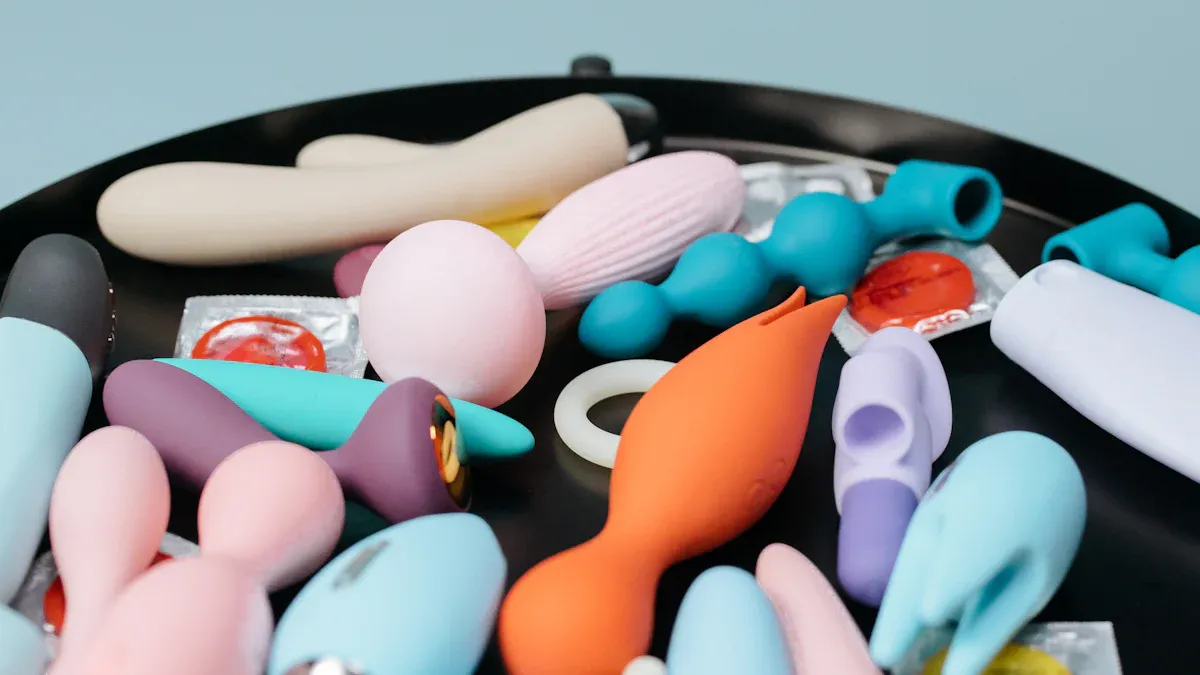
Silicone
If you want a safe sex toy, platinum silicone is a great pick. Health experts say platinum silicone is body-safe. It does not let germs in and is not toxic. You can clean it easily. Medical-grade silicone and platinum silicone are tested very well. You can use them for a long time without worry. They do not have phthalates or other bad chemicals. You can boil or put silicone dildos in the dishwasher. This kills germs and makes them safer than PVC toys.
Here is a table that shows how platinum silicone dildos and PVC dildos are different:
Feature | Platinum Silicone | PVC |
|---|---|---|
Hypoallergenic | Yes, hypoallergenic and non-toxic | May contain phthalates |
Toxicity | Free from harmful chemicals | Contains chemical additives |
Surface Porosity | Non-porous, resists bacteria and mold | Porous, can harbor bacteria and mold |
Hygiene | Easy to clean and sterilize | Hard to clean thoroughly |
Durability | High durability and longevity | Less durable |
Flexibility | Superior flexibility for comfort | Limited flexibility |
Platinum silicone dildos last longer and feel softer. They are good for people with sensitive skin. For the safest choice, pick medical-grade silicone or platinum silicone dildos.
Glass and Metal
Glass and metal dildos are also very safe. Medical-grade borosilicate glass is strong and body-safe. You can boil glass dildos or wash them in the dishwasher. This kills germs. Stainless steel dildos are nonporous, non-toxic, and very strong. They do not rust or keep germs. Both glass and metal dildos are safer than pvc sex toys. You can use any lube with them. They are easy to clean.
Tip: Always look for cracks in glass dildos before you use them. Even strong glass can chip, and a chip can hurt you.
Why They’re Safer
You should use body-safe materials to protect your health. Platinum silicone, medical-grade silicone, borosilicate glass, and stainless steel do not let germs or chemicals inside. These materials are nonporous and can be cleaned very well. Studies show that silicone, glass, and metal toys lower your risk of infection and allergies. You do not have to worry about phthalates or other toxins. Toys made from these materials last longer and are easy to keep clean.
Here are some body-safe materials that health experts suggest:
Medical-grade silicone (platinum-cured)
Body-safe silicone (cured with precious metals)
Borosilicate glass (lead-free)
Stainless steel (nickel-free)
Gold and silver (if you are not allergic)
When you pick platinum silicone, glass, or metal, you stay safer and more comfortable. These safe choices are better than pvc sex toys. They help you feel good and worry less.
PVC dildos can be risky for your health. They might have bad chemicals and are tough to clean well. It is best not to use them inside your body. Platinum silicone dildos are a safer pick. Platinum silicone does not let germs in and is simple to wash. This helps keep you healthy. Experts say platinum silicone, glass, and metal are the safest choices. Always look for platinum silicone when buying a new dildo. Using good cleaning habits and safe materials keeps you healthy.
Tip: Pick platinum silicone or glass for the safest use. Stay away from toys that smell strong or have unclear labels.

